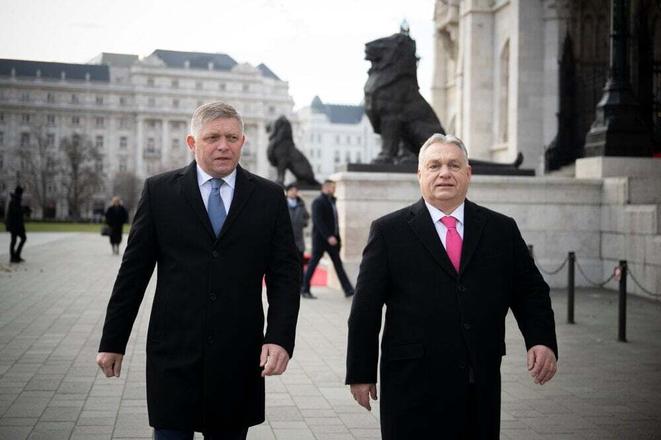Hungarian Prime Minister Viktor Orbán and Slovak counterpart Robert Fico both expressed defiance over Western pressure to abandon Russian energy on 28 September during a joint appearance at the 130th anniversary of the Maria Valeria Bridge connecting their two countries across the Danube River in Esztergom, Hungary.
“No one should tell us where to buy oil and gas from,” Fico declared.”Because, under international law, it is a sovereign country that decides its energy mix.”
Just days earlier, Orbán had told state radio that he had directly informed Trump that cutting Russian energy would be an economic “disaster” for Hungary.
“If Hungary is cut off from Russian oil and natural gas, immediately, within a minute, Hungarian economic performance will drop by 4%,” Orbán said. “It means the Hungarian economy would be on its knees.“
According to Hungarian Foreign Minister Peter Szijjarto, Trump and Orbán’s phone conversation on 25 September covered energy security, Russia’s war on Ukraine, the global economy, and tariffs. Trump raised the idea of urging Orbán to scale back Russian crude imports while meeting with Ukrainian President Volodymyr Zelenskyy.
But the economic necessity argument faces a problem: other countries in the region, including the similarly landlocked Czech Republic, have managed to fully cease their purchases of Russian oil since Moscow launched its invasion in February 2022. Prague’s success in pivoting away from Russian energy undermines claims that geographical constraints make alternatives impossible.
A shrinking club of Russian energy buyers
Hungary and Slovakia remain among the only countries in Europe to continue purchasing Russian oil and natural gas following Russia’s full-scale invasion of Ukraine in February 2022.
Despite three years of EU efforts to wean off Russian energy supplies—an effort to deprive President Vladimir Putin of revenue that helps fuel the war in Ukraine—Hungarian officials have insisted that geographical and infrastructural constraints make transitioning to Western-supplied fossil fuels nearly impossible.
The continued purchases represent a substantial revenue stream for Moscow’s war effort. Every barrel of Russian oil purchased by Hungary and Slovakia directly finances military operations against Ukraine, making the energy relationship a strategic rather than merely economic question.
Brussels prepares tariff response
In response to growing pressure from Trump to permanently sever all energy relations with Moscow, the European Commission announced it is developing a new plan to slap new tariffs on Russian oil that continues to enter the single market through Hungary and Slovakia. The mechanism could effectively price Russian oil out of competitiveness even without a complete ban, forcing the two countries to seek alternatives despite their political resistance.
What comes next
According to critics, Orbán and Fico’s pro-Kremlin stances may reinforce their domestic authority but erode Europe’s common stand against Russia’s aggression.
Orbán, widely considered the EU leader with the closest relationship to the Kremlin, insisted on 26 September that when it comes to energy sources,
“It is clear what is in Hungary’s interest and we will act accordingly.“
He added that Hungary and the United States “are sovereign countries. There is no need for either of us to accept the arguments of the other.”




